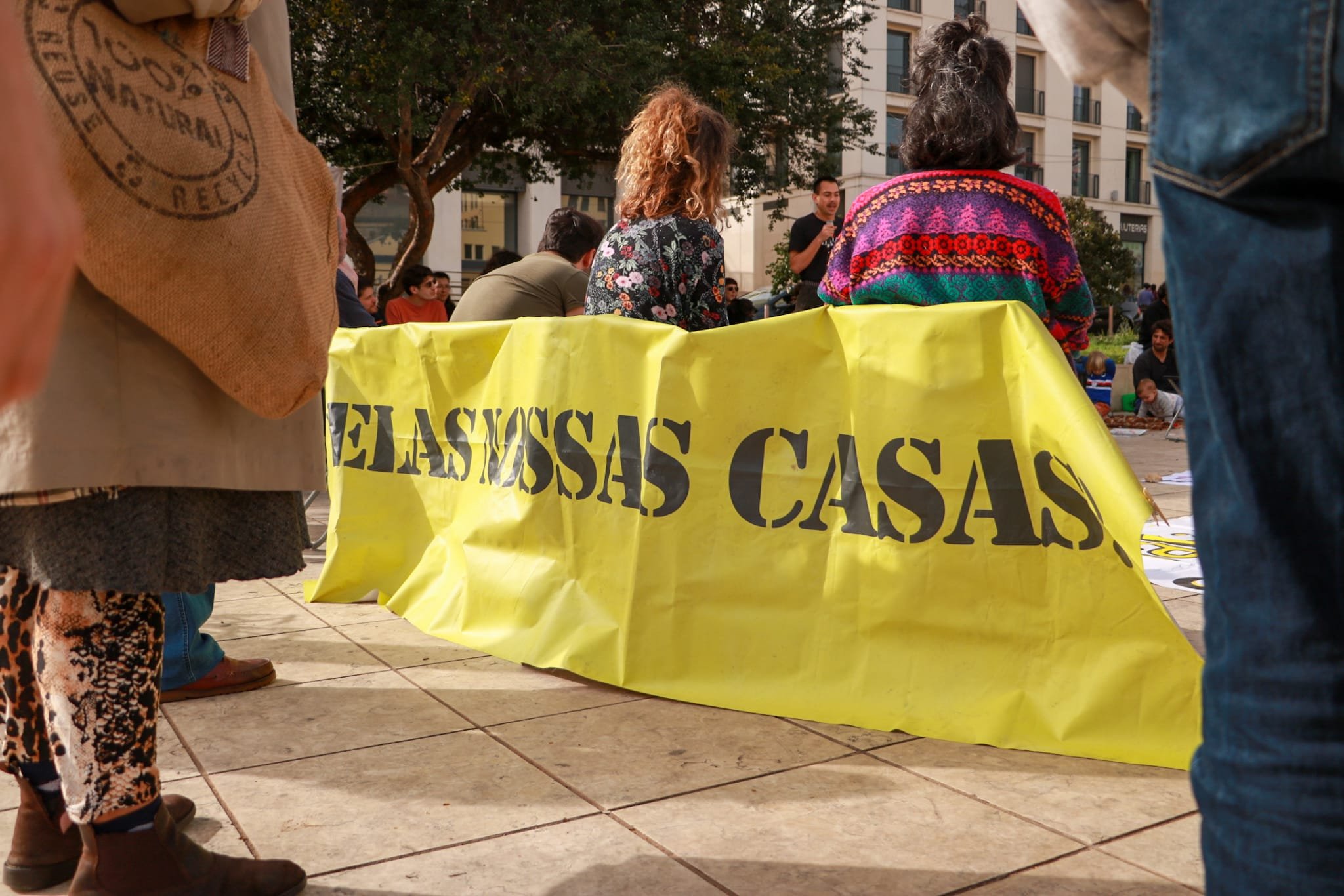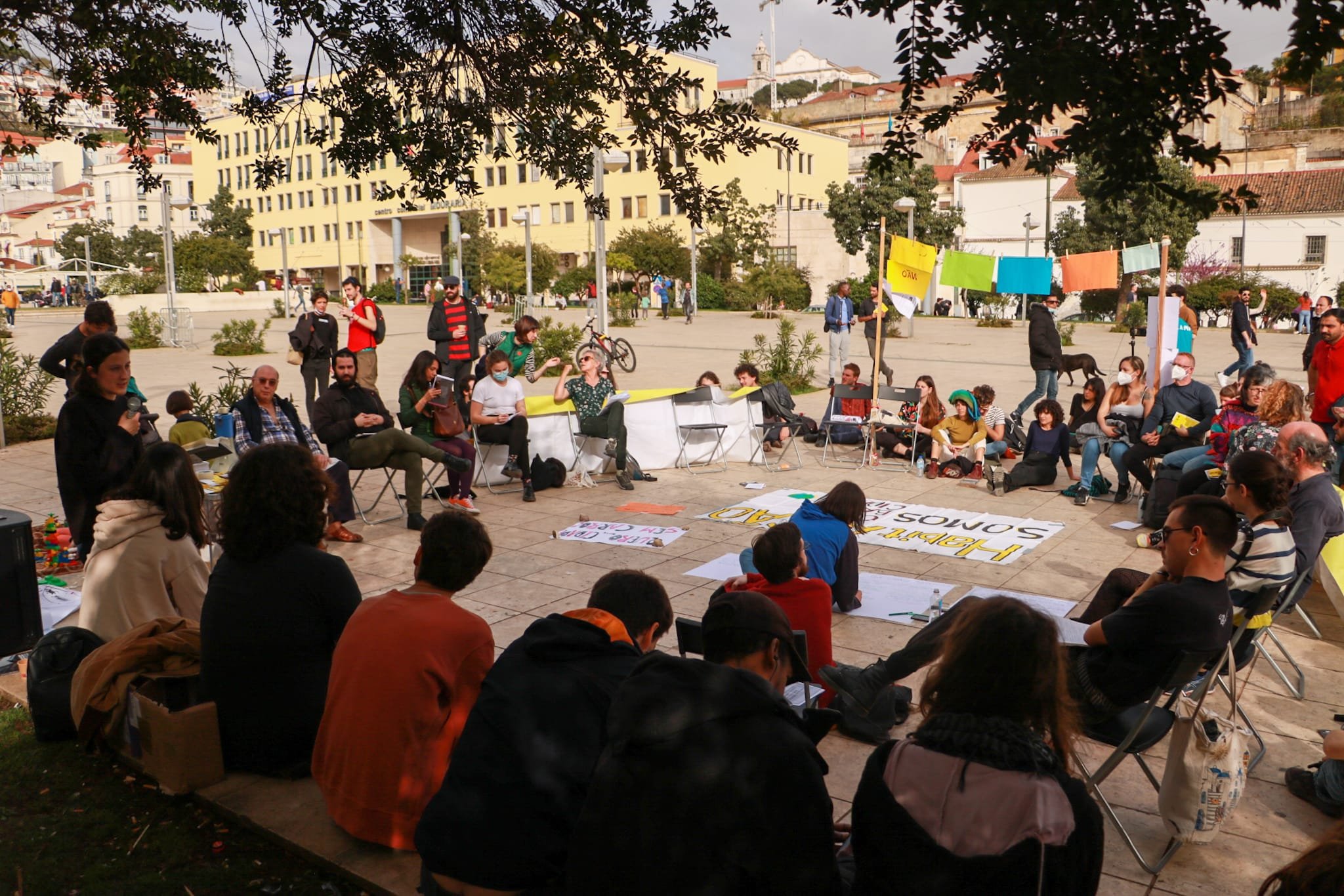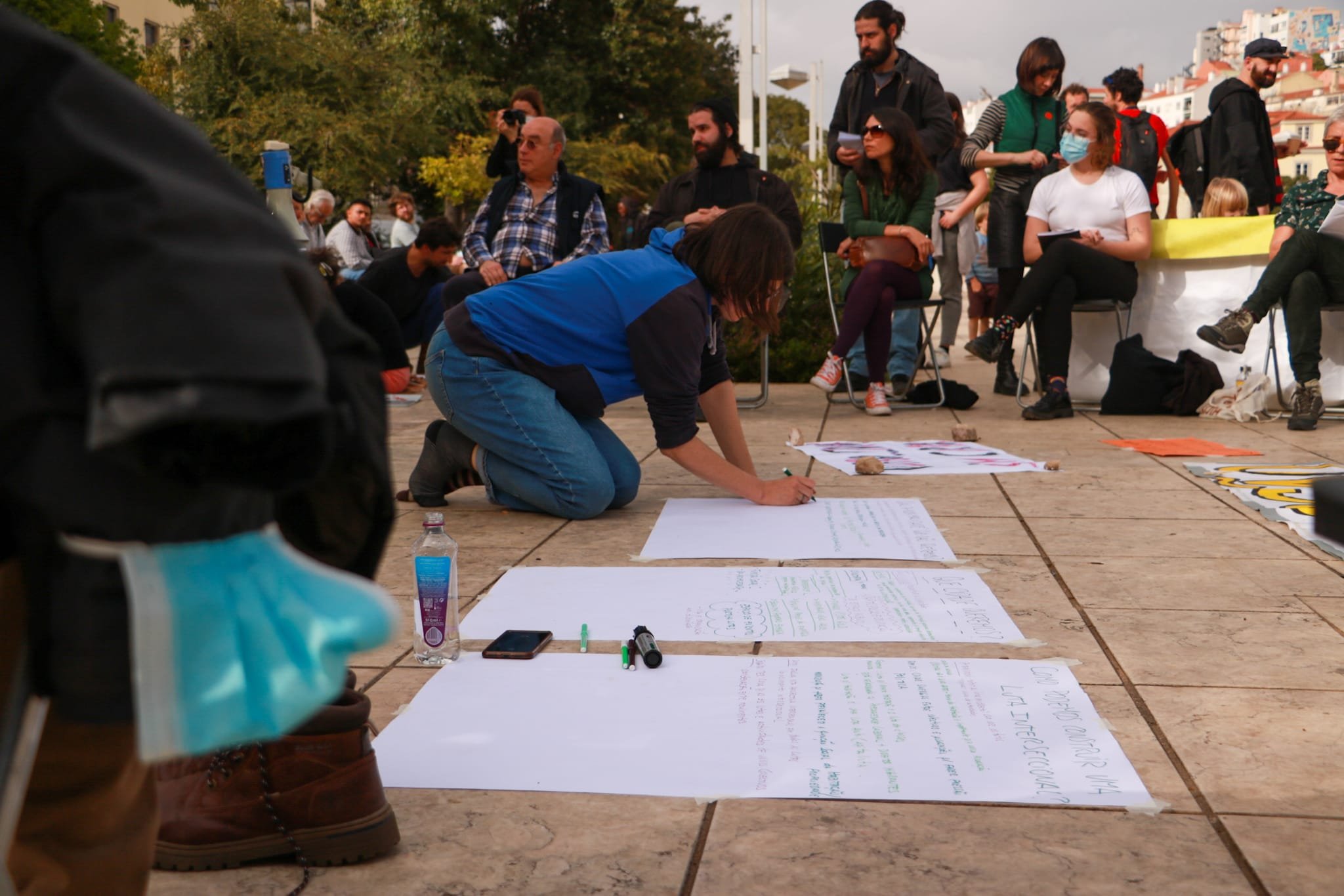"What kind of city do we want?"
Grassroots mobilization in Lisbon against the aggravating housing crisis
Affordable housing is becoming rare in Portugal’s capital, Lisbon. The development can be traced back to the 2008 European debt crisis. As a condition of its bailout, Portugal was forced to deregulate the housing market. A “golden visa” programme, offering residency permits in exchange for real-estate acquisitions worth €500,000 or more, and a “non-habitual residency scheme”, which gave foreign citizens who spent half the year in Portugal a 10-year tax break on income earned elsewhere, were introduced to attract foreign investment. The results have been fatal: Housing prices have increased tenfold in many Lisbon neighbourhoods in the last few years. Wages or pensions have not risen accordingly, and ordinary workers and their families are not able to pay the high prices any more.
Civil society initiatives in Lisbon, like Habita!, commit to fighting this trend. Habita is also part of the European Action Coalition for the Right to Housing and the City, in which several groups from Europe Join forces and exchange experiences and knowledge once a year. To mark Housing Action Day, on the 26th of March this year, Habita brought together a group of people in a circle, at Martim Moniz Square, in the Portuguese capital Lisbon. On the floor, there were sheets of paper laid out for anyone who wanted to share ideas. It was in this atmosphere of constructive discussion that TEMA spoke with Sara Fernandes, an activist that works with Habita.
“Houses for people and not for profit!”
TEMA: What are the challenges and the constraints you face when promoting housing equality in Lisbon?
Sara Fernandes (SF): The lack of availability. We accompany people who are in very precarious situations in terms of work, housing and mental health, so it's difficult to understand how we work with people who have a situation of great fragility. And then it's about having hands, having doors, having voices that join the fight... it takes work.
TEMA: What kind of mobilisation strategies create an effective change?
SF: Local organization. In other words, people who realise that they have to organise themselves in their neighbourhoods so that they can support each other. For example, in the case of eviction*, it’s hard for us to reach the people immediately. What we can do is: share our knowledge, help to organise and give visibility. We have visibility and, as an association that defends the right to housing, we give visibility to those who need it.
*Eviction is considered to be the procedure of private or public initiative to promote the forced eviction of dwellings unduly or illegally occupied.
TEMA: And in what way have your actions helped people in Lisbon?
SF: It's a bit of a struggle... but I think there are small victories. We saved some people from eviction. And individual victories are of course great for the people - and they're good for us. They give us motivation. But individual victories are not enough for systemic change. We need to do other things, like intervening and lobbying. We did that to have a ‘Housing Act’ [Lei de Bases da Habitação, in Portuguese]; and now we have meetings to regulate it... There are several levels we have to work on. But there are still folks who went to live in self-built neighbourhoods or became homeless again, so this problem perpetuates itself. It's like a blanket that leaves your feet uncovered when you try to cover your head.
TEMA: What’s the role of social movements like Habita! in the housing crisis?
SF: People often think: 'there is social security, this doesn't happen; people are not thrown out of their houses.' But it is happening. So, our job is to denounce. Denounce, denounce, denounce and make more people realise that the system doesn't work. There is still a lot of faith in the system - especially from the middle class. The national health system is an argument that is often used... But this is not how it works with housing, even though it’s linked: How can I be healthy if I don't have a good house to live in? How can I get a job if I live on the street? There is an initiative created by the government itself which is called "Housing First"*. The system is recognising that the right to a home is fundamental to human wellbeing. But we continue allowing it to be just a privilege (), We keep saying: housing is a right. But it's not yet in people's heads.
*Housing First - housing programme which consists in providing individual houses to homeless people.
TEMA: What kind of strategies do you think are useful to attract more people to join your movement?
SF: I believe that culture and the arts can attract many more people. One of the most active and successful movements during the pandemic was the cultural one. People went out on the street for artists, music, poetry, painting and diversifying languages. People don't have the patience to read a manifesto. But you can make an exhibition... Culture is a very important way of reaching an alternative way of thinking. I like this perspective of doing artivism* - but this is my personal position; it is not Habita’s.
*Artivism, as an expression of art, is based on a cultural positioning of critical and creative thinking, which aims to raise awareness and civic responsibility for social change. It proposes action, direct intervention and transformation.
TEMA: Many of my friends don’t believe in grassroots mobilisation. It’s not that they don’t want to change things, but they don’t believe going out on the streets will change anything. What’s your opinion?
SF: If there wasn’t this type of mobilisation, we wouldn't have lived through the 25th of April*[1974]. Both of us, as women, wouldn't be able to vote, nor could we be here, demonstrating. We would’ve had to ask our husband's permission. If there would not have been social movements like this one, having this conversation here today - you are a journalist, I am an activist - would not have been possible. It is only possible because people before us worked hard and believed that change was possible.
*25th of April - milestone in the history of Portugal led by a military movement that put an end to the dictatorship of the Estado Novo (in force since 1933). The revolution - also known as the Revolução dos Cravos (a flower) - took place on 25 April 1974 and began a process of transition to democracy.
TEMA: Does change only happen with a revolution?
SF: No. Changes are being made while we speak. Rebellion, and resistance, are important. And "movement" means that today it is me, but tomorrow there's someone else. And we don't only do demonstrations; we need people working on a daily basis. Each group, each struggle, has its specific activities; we need diversity.
“Choosing between the house or the bread? No!” – “Scrap the gold visas! Housing is not a privilege” – “Regulate the price of rents - enough speculation”
TEMA: Let’s focus on this topic of diversity and intersectionality*. In which way is the fight for the right to housing is transversal to all the other fights?
SF: One thing we must bear in mind is that the problem is systemic. It's a problem with the system in which we live. And it expresses itself in various ways, in various discriminations. The common thread here is the capitalist system. It's the capitalist system that creates the housing crisis. The faults are the policies and the system that we have. If Portugal was ruled by a truly socialist party, we wouldn't have the problem of underfinanced public housing*. It's not only the housing crisis. Also, issues like racial and gender discrimination come from this system. If the situation is already bad for the white middle class, then imagine how it is for poor people, racialised people, women or LGBTQI... This is how things intersect. Nowadays, I think almost all anti-capitalist collectives are feminist, anti-racist, anti-discrimination... A lot of "anti", right? But how to turn the “anti-” attitude into something constructive? What kind of city do we want, and how can we fight for it? It’s not only about identifying the problems, but also creating common strategies to produce solutions that are good for everyone.
*Intersecctionality or multiple discrimination is based on the combination of two or more grounds of discrimination, such as gender, age, ethnicity, caste, class, religion, sexual orientation, disability.
**Underfinanced public housing: In Lisbon, only 3% of all buildings are state-owned public housing.
Bibliography & further readings
Habita! - Association for the right to housing and to the city: https://habita.info/
European Action Coalition For the Right to Housing and to The City: https://housingnotprofit.org
Cities For Rent: Investigating Corporate Landlords Across Europe. Read more about this cross-border investigation here.
Portuguese Housing Act [Lei de Bases da Habitação, in portuguese]: https://dre.pt/dre/detalhe/lei/83-2019-124392055





